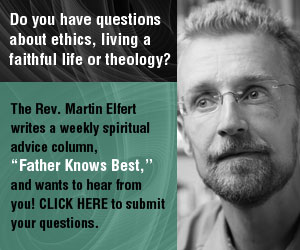Do you have a question about life, love, or faith? Submit it online, fill out the form below or email it to melfert@stjohns-cathedral.org.
Hey Rev!
Do you pray?
– Reese
A while back in this very column, I spent some time wondering about Paul’s famous instruction to “pray without ceasing.” I suggested that, if we take Paul seriously, then prayer must be a way of being in the world as much as it is a discrete action. There must, in other words, be a way of talking to another person, a way of making a donation to a charity, a way of eating dinner, a way of breathing, a way of making love that turns these actions into prayers.
What I didn’t do in that column was to spend a whole lot of time talking about what we popularly understand as prayer, that is to say intentionally setting aside time in which to enter into conversation with God. I’m going to take your question, Reese, as an invitation to wonder about that kind of prayer now.
Anne Lamott argues that there are three “essential prayers”: Help, Thanks, and Wow. Let’s use her categories as a guide for our conversation.
Help is probably what we think of most of most often when we speak of praying: in this kind of prayer, we hold ourselves or another person or a community or a situation in the world before God. Many of us, for example, have a daily practice of remembering people who are struggling with illness, with injury, with grief, with addiction, with loneliness, or with some other kind of hurt.
I believe that this kind of prayer does indeed help those for whom we pray, although I couldn’t even begin to explain how that works; the mechanics of prayer is a subject on which I am a reverent agnostic. What I do know is that Help is not just about the people whom or the places that we hold in the light; this kind of prayer also changes the one who prays. By remembering another person in this way, you and I are much more likely to pay that person a visit at home or at the hospital, to make her a meal, to otherwise assist him in finding the resources that she needs. Help is a prayer that calls us into generosity. Help reminds us that, as Teresa of Avila said, “Christ has no body but yours, / No hands, no feet on earth but yours, / Yours are the eyes with which he looks / Compassion on this world…”
Lamott’s second category, Thanks, is a choice to encounter reality through a lens of gratitude. David Steindl-Rast says that “gratefulness [is the] heart of prayer.” And I suspect that he is right. Saying “thanks” reminds us that we are surrounded by gifts, that this creation is a gift, that our very lives are gifts. Saying “thanks” reminds us that these gifts are fleeting – that we have but a while to say “I love you” or “I’m sorry,” that we have but a while to nurture beauty and healing, that we have but a while to seek out joy. Saying “thanks” invites us to live with grateful urgency.
Thanks also helps to insulate us against the lonely hubris of supposing that we are entirely on our own in the great journey of our lives, that our successes and our failures are something that we must build and bear all alone. Thanks reminds us that there is another who wants us to join in the work of building community and compassion and creativity.
Wow stands as a reminder of the majesty of life, as an invitation into wonder. This kind of prayer directs our gaze towards the beautiful improbability of the world around us. It invites us to look in joyous disbelief upon a newborn child, to sit in quiet sorrow and awe beside a dying friend, to giggle in delight at a world in which guinea pigs and peacocks exist.
As importantly, Wow is a safeguard against cynicism, against lapsing into that place in which this world seems tawdry and obvious and old. Wow reminds us of the miracle that is being itself. In Thích Nhất Hạnh’s deservedly famous words, Wow reminds us that, “The miracle is not to walk on water. The miracle is to walk on the green earth, dwelling deeply in the present moment and feeling truly alive.”
A final thought, Reese: a lot of folks who are beginning their experiments with prayer find themselves frustrated. Perhaps it’s hard for them to focus, perhaps a method of prayer that works for someone else doesn’t work all that well for them. If that’s true for you, take consolation in the simple and beautiful advice of Ellen Clark-King: Pray as you can, not as you can’t.
If what works for you is saying set prayers out of a book, that’s good. If what works for you is envisioning a scene from scripture or from your past, that’s good. If what works for you is sitting in silence, that’s good. Try out different possibilities. And know, Reese, that God is looking forward to trying them out with you.









